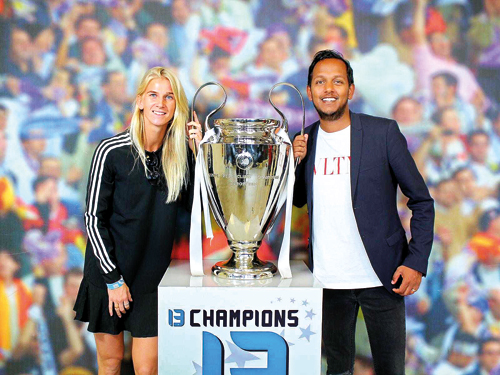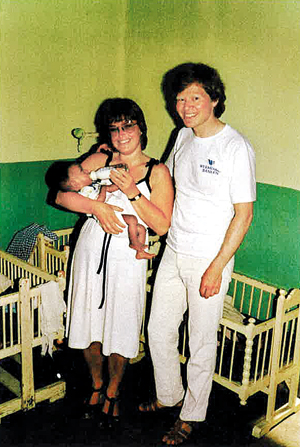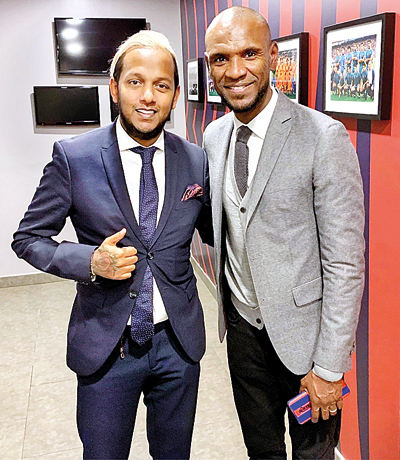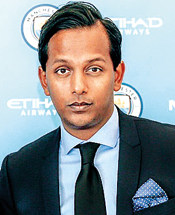From Katukithula to Sweden

Michael with Sofia Jakobsson when she signed for Real Madrid (Pic courtesy Real Madrid)
Thirty-six-year-old Michael Kallbäck is a Swedish sports agent of global standing. But his amazing life story began in a tiny village in Sri Lanka.
Michael was born in 1985 and grew up in Degerfors, Sweden, brought up by Swedish parents. He is one of the first established agents to represent both men and women athletes. He is the CEO and founder of Neverland Management, one of the world’s leading sports agencies in women’s football.
But he had always known of his Sri Lankan heritage, Michael told the Sunday Times in an e-mail interview. His Swedish parents had told him how he was adopted at just a few months old. They showed him photos and spoke of the country.
“During my youth I never felt Sri Lankan at all,” he said. “I felt fully Swedish. This changed when I got older.” His feeling of connection with Sri Lanka strengthened after he visited for the first time.
 The tale of how Michael found his birth mother is nothing short of serendipitous. In February 2015, he went to Kandy and Gampola to look for her, armed with just his Sinhala language birth certificate and a photograph of his mother and him as a newborn. He had no address. But he knew he was adopted from the St Leonard’s Home, an orphanage in Gampola.
The tale of how Michael found his birth mother is nothing short of serendipitous. In February 2015, he went to Kandy and Gampola to look for her, armed with just his Sinhala language birth certificate and a photograph of his mother and him as a newborn. He had no address. But he knew he was adopted from the St Leonard’s Home, an orphanage in Gampola.

Michael as an infant when he was adopted by Swedish parents
Michael visited the police, the post office and “many other places”. The photo of his mother was decades old and nobody recognised her. Still, it felt good coming to Sri Lanka and seeing its culture, natural beauty and meeting people, he said. It was just his driver and him so he had “all the time in the world just trying to capture the moment”.
After three days, Michael had nearly given up. He instructed his driver to head back to Colombo. But an hour later, he decided to Google the place called “Katukithula” in his birth certificate.
“I had Googled it before and never found something,” he narrated. “This time, I found a place called Lavender House in Pussellawa, Katukithula. I saw it was an old English colonial villa converted to a resort or hotel. So, I told the driver, let’s turn around and go to this place because it looked amazing in the photos. I was thrilled by the nature and the view.”
There were no other guests. The entire staff lined up to greet Michael. The manager, Yatagama Lokuge Asanka, asked for his passport to check him in. Out fell a photo of his mother. Mr Asanka took it up, looked at it and said, “Ah, I knew this girl, she used to live in the area but she moved long time ago. Her mother lives down in the plantations.”
“My heart was beating like I was about to take a penalty in the World Cup final,” Michael recollected. He told Mr Asanka about his search and was told his grandmother probably still lived in the village. And he promised to take Michael there the next day.
He barely slept that night. It finally felt real. “Before, I had not got this intense feeling of, ‘Wow, I might even actually find my birth mother’,” he said. “And, to be honest, I was never really that upset about it either. But now it all of a sudden became serious.”

Neetha Kumarasinghe - Michael's biological mother in Sri Lanka
Michael had tea and breakfast–“one of the best I ever had”–on the back porch of Lavender House the next morning, with a stunning view of the tea plantations. Mr Asanka later took him to what did, indeed, turn out to be his grandmother’s house. He found that his mother had relocated first to Asia and then to Qatar after his birth. She now worked in the household of a European family in Doha.
“My grandmother was really short,” he said. “That was the first thing I noticed. And that’s how I came in contact with my family.”
Michael’s grandmother took his number and conveyed it to his birth mother. She contacted him. “It felt so good,” he said. “Finally, I found my birth mother. And she looked a lot like me as well.” He did not meet her immediately as she was still in Qatar. So he went back to Sweden and returned a few months later, when she was home visiting her mother.
“And then I got to meet her,” he said. “I once again stayed at Lavender House. And the first time met her, we went to dinner there. We spoke for hours. I had so many things to ask.”
Michael learnt why it had been so hard to find her. On his birth certificate, her name is “T.G. Pathmalatha”. But she changed her name to Neetha Kumarasinghe. They have known each other a few years now. He notices their similarities. For instance, they are both intense and hot-tempered. But she is also a survivor.

Michael with Eric Abidal, the former Player and Sport Director of FC Barcelona (Pic courtesy FC Barcelona)
“She got me in early age and still managed to re-locate to Qatar, get a good job and got married to a great man,” he said. “She’s very strong.” They speak quite often. And Michael has a new sibling who keeps his mother occupied and who he says he can’t wait to meet.
Of Sri Lanka, Michael said he hadn’t known much in the past–except about the civil war and something of sport in the country. As he arrived, he had scheduled a meeting with the President of Sri Lanka Football Federation and also watched the Sri Lanka Vs Bhutan game. He even recalls getting a job offer from the Federation.
While working to develop Sri Lankan football “would’ve been a dream for me”, the time was not right. Michael had just started his own business and established himself as one of Scandinavia’s best agents.
But he would still like to embrace his Sri Lankan side, even if he doesn’t know how to at this point. He knows the Federation’s President, Anura de Silva, well and said it could be an idea to make contact again. He has worked in every continent with the best clubs and players there are. “I like to think that my experience from football, and my network, could be a huge gain for the Sri Lankan FA,” he reflected.
Of course, he wouldn’t consider totally leaving what he was doing now. If there was an interest for the FA to consult him in anything, however, he would be glad to help: “My dream is to be a part of developing Sri Lankan football.”

Michael's only documented source about his birth available. It was well preserved by his Swedish parents, who related his story and encouraged him to fly to Sri Lanka and experience his country of birth
Michael’s own career started when he played for Degerfors IF, one of the most classical teams in Sweden that has raised profiles such as Gunnar Nordahl, Ralf Edström, Ola Toivonen and Olof Mellberg, to mention a few.
“And when I was young, they played the European Cup against Parma from Italy that, at the time, had a fantastic team with Zola, Asprillia, Brolin and Bennarivo,” he said. “So I played in Degerfors, but I never made it to the big scenes, which maybe was good because I think I do better now, as an agent, ha ha!”
Until his daughter was born, just before he went to Sri Lanka, Michael had only represented male players as an agent. But then he started thinking, “What if she becomes interested in football and asks why her father represents only male players”. That was a key factor in him also taking on female players.
“The job is fantastic,” he enthused. “I first coached some teams, and I got my UEFA A licence. Then I became the Sport Director of two clubs in Sweden, Ängelholms FF and then IK Brage. After leaving IK Brage in 2013, I started my own company as an agent. That’s what I have been doing since.”
“I put as much joy as working with clubs in Sweden as I do working with the biggest clubs in the world,” he said. “It’s fantastic to see the contrasts and at the same time the similarities. The world of football is fantastic, and it reunites people all over the world.”
| Profile | |

More information: |


